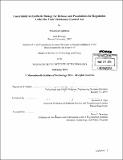Uncertainty in synthetic biology for release and possibilities for regulation under the Toxic Substances Control Act
Author(s)
Lightfoot, Shlomiya
DownloadFull printable version (5.184Mb)
Other Contributors
Massachusetts Institute of Technology. Technology and Policy Program.
Advisor
Kenneth A. Oye.
Terms of use
Metadata
Show full item recordAbstract
The emerging field of synthetic biology is developing rapidly and promises diverse applications. Many anticipated applications, particularly those involving release of engineered microbes into the environment or human bodies, have potential environmental and health implications. These implications, which present design challenges to engineers, stem from organisms' potential for competitiveness with natural strains upon entering an environment, their tendency to evolve new characteristics after leaving the lab, and their propensity to exchange genetic material with other organisms they encounter. The field's rapid evolution and the substantial uncertainties in the technology and relevant sciences present challenges to regulators seeking to ensure health and environmental wellbeing. Regulations exhibiting planned adaptation are especially suited to such contexts of uncertainty. However, the synthetic biology applications first nearing commercialization are regulated by the EPA under the Toxic Substances Control Act (TSCA), which was not written to be adaptive. EPA regulators appear to be using TSCA adaptively even though it was not written this way. An examination of characteristics of planned adaptation using the EPA program for ambient air standards as a case study suggests more that the regulators may be able to do to regulate synthetic biology effectively by using TSCA adaptively. Due to statutory language and court history, TSCA is essentially incapable of imposing restrictions or setting standards. Examination of the emerging algal biofuels industry as a case study suggests that concepts of industry-favored regulation may be useful to the EPA for fashioning strong regulations that would promote real health and environmental wellbeing.
Description
Thesis: S.M. in Technology and Policy, Massachusetts Institute of Technology, Engineering Systems Division, Technology and Policy Program, 2014. 260 Cataloged from PDF version of thesis. Includes bibliographical references (pages 52-64).
Date issued
2014Department
Massachusetts Institute of Technology. Engineering Systems Division; Technology and Policy ProgramPublisher
Massachusetts Institute of Technology
Keywords
Engineering Systems Division., Technology and Policy Program.